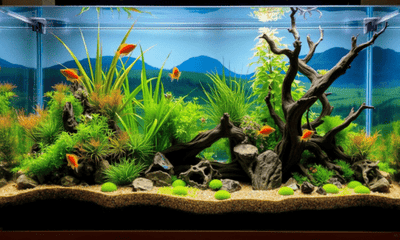Creating a balanced and healthy tank environment can seem complex, but with a few key insights, it’s easy to maintain clear, healthy water and happy fish. Here’s how to keep an eye on your tank’s health, what to look for, and when it might be time for a little intervention.
Observe Water Clarity
The clarity of your tank water is one of the first indicators of water quality. While a little cloudiness when setting up a new tank can be normal, healthy tank water should be clear and free from debris or a murky appearance. Persistent cloudiness may indicate:
- Bacterial Blooms: Often occurs in new tanks or due to overfeeding. This can create a milky appearance in the water
- Algae Overgrowth: Causes a green tint and can be a sign of too much light or excessive nutrients
If you notice prolonged cloudiness, it’s worth checking for other potential imbalances, which can often be corrected with regular water changes and reducing excess food or waste in the tank.
Watch Your Fish's Behaviour
Your fish’s behaviour can tell you a lot about the tank’s water quality. Fish should swim actively, breathe easily, and display their natural colours. Here’s what to watch for:
- Gasping for Air at the Surface: This can indicate low oxygen levels or poor water quality
- Lethargy or Hiding Constantly: Could be due to high toxin levels (like ammonia or nitrates) or stressful water conditions
- Colour Changes: Dullness or colour loss in fish can sometimes indicate stress or illness, often related to water quality
Regular observation helps you quickly detect these issues and address any imbalances in the tank.
Test pH Levels
Maintaining a stable pH level is essential to your tank’s health. Different fish species thrive in different pH ranges, so it’s important to know the ideal pH level for your specific tank inhabitants. Check pH with a pH test kit at least weekly, or more frequently if you’re adjusting water or adding new elements to the tank.
Changes in pH can occur due to:
- Water Changes: If your tap water has a different pH than the tank.
- Driftwood, Rocks, or Substrates: These can alter pH levels over time.
Keeping a stable pH in the recommended range for your fish reduces stress and keeps them healthier over time.
Monitor Ammonia, Nitrite, and Nitrate Levels
High levels of ammonia and nitrites are toxic to fish and are often the result of decaying organic material, such as excess food, fish waste, or dead plant matter. Nitrite is particularly harmful because it interferes with a fish's ability to absorb oxygen.
- Ammonia and Nitrite: These should ideally be at 0 parts per million (ppm)
- Nitrate: Can accumulate gradually but should remain under 20-40 ppm. While less toxic, high nitrates can lead to stress and algae growth
Regular testing will alert you to any imbalances and allow for water changes before they become harmful.
Keep Algae in Check
A little algae in your tank is normal, but excessive growth could mean there’s too much light or an overabundance of nutrients, usually from waste buildup. Here’s how to manage it:
- Limit Lighting: Only keep lights on for 8-10 hours per day
- Regular Cleaning: Gently scrub away algae during weekly maintenance
- Control Feeding: Excess nutrients from overfeeding can fuel algae growth
Using algae-eating species like certain snails, shrimp, or fish can also help control algae without disturbing the ecosystem.
Check Temperature and Equipment
Each type of fish requires a specific temperature range, so maintaining a consistent temperature is crucial. Make sure heaters and filters are functioning well and clean the filter regularly to prevent it from clogging, which can reduce water flow and filtration efficiency.
- Sudden Temperature Changes: Fish are sensitive to temperature swings, so always introduce new water slowly.
- Filter Cleaning: A clean filter helps maintain water clarity and removes waste that can lead to toxicity.
Bring a Sample for Free Water Testing
It can sometimes be tricky to pinpoint what’s wrong just by observing. That’s why we offer free water testing at Woonona Petfoods! Simply bring in a sample, and we’ll check for pH, ammonia, nitrite, and nitrate levels. Testing your water regularly gives you peace of mind and keeps your fish in a healthy environment.
With a little proactive care and regular monitoring, maintaining a healthy tank becomes easy. Clear water, happy fish, and controlled algae mean you’re on the right track. So, keep an eye out for signs of imbalance, test the water often, and enjoy a thriving, beautiful aquarium!






